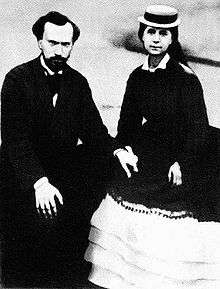Charles Longuet
Charles Félix César Longuet (14 February 1839, Caen – 5 August 1903, Paris) was a journalist and prominent figure in the French working-class movement, including the 1871 Paris Commune, as well as a Proudhonist member of the General Council of the First International or International Working Men's Association (1866–67, 1871–72). He served as Corresponding Secretary for Belgium (1866),[1] delegate to the Lausanne[2] (1867), Brussels (1868), the London Conference (1871) and the (1872).[3] He was also the editor of the publication Journal Officiel.[4]
Charles Longuet | |
|---|---|
 | |
| Born | Charles Félix César Longuet 14 February 1839 |
| Died | 5 August 1903 (aged 64) Paris, France |
| Occupation | Journalist |
| Spouse(s) | Jenny Marx |
| Children | 6 (including Jean Longuet and Edgar Longuet) |
| Relatives | Karl Marx (father-in-law) Jenny von Westphalen (mother-in-law) Laura Marx (sister-in-law) Eleanor Marx (sister-in-law) |
Longuet participated in the Paris Commune of 1871 and, after its defeat, moved to England as a refugee where he met Karl Marx. Longuet married Marx's eldest daughter, Jenny, on 2 October 1872 in London (in a civil ceremony). Together, they had six children, the first five of whom were boys, the last a daughter.[5] Two of the sons died in infancy. Of the others, Jean, a journalist and Edgar, a physician, both became prominent socialist activists in France.[6]
Longuet returned to France, after a political amnesty granted by the French government in July 1880. Here he took a position as an editor of La Justice, a radical daily newspaper founded by Georges Clemenceau.[7] His wife and children joined him in February 1881, the family settling in the town of Argenteuil, near Paris.[8] Here Jenny died in January 1883, probably from cancer of the bladder.[5] Two months later her father, Karl Marx, died; Longuet was one of the speakers at his funeral.[9]
Charles Longuet died in Paris on 5 August 1903 at the age of 64. He was buried at the Père Lachaise Cemetery.
Notes
- Belgian section International Working Men's Association Collection
- Yuri Mikhailovich Steklov, History of The First International, chapter 8 Archived 2007-09-26 at the Wayback Machine
- Steklov, History of the First International, Hague chapter 14 Archived 2007-09-26 at the Wayback Machine
- Francis Wheen. 1999. Karl Marx: A Life. London: WW Norton & Company. p326.
- Francis Wheen. 1999. Karl Marx: A Life. London: WW Norton & Company. pp.350, 379.
- Saul K. Padover, Karl Marx: An Intimate Biography. New York: McGraw-Hill Book Co., 1978; pp. 479-480.
- Francis Wheen. Karl Marx: A Life. London: W.W. Norton & Company, 1999; pp. 373-374.
- Saul K. Padover, Karl Marx: An Intimate Biography. New York: McGraw-Hill Book Co., 1978; pp. 481-484.
- A Darwinian Gentleman at Marx's Funeral - E. Ray Lankester | Natural History | Find Articles at BNET.com